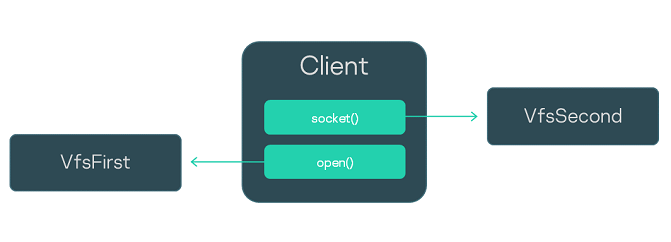Using VFS backends to separate file calls and network calls
This example shows a secure development pattern that separates network data streams from file data streams.
Let's examine a Client program using file systems and Berkeley sockets. To handle its calls, we will start not one but two separate VFS processes from the VfsFirst and VfsSecond executable files. We will use environment variables to assign the file backends to work via the channel to VfsFirst and assign the network backends to work via the channel to VfsSecond. We will use the standard backends client and server. This way, we will redirect the file calls of the Client to VfsFirst and redirect the network calls to VfsSecond. To pass the environment variables to processes, we will add the Env program to the solution.

The init description of the solution is provided below. The Client process will be connected to the VfsFirst and VfsSecond processes, and each of the three processes will be connected to the Env process. Please note that the name of the IPC channel to the Env process is defined by using the ENV_SERVICE_NAME variable.
init.yaml
entities:
- name: Env
- name: Client
connections:
- target: Env
id: {var: ENV_SERVICE_NAME, include: env/env.h}
- target: VfsFirst
id: VFS1
- target: VfsSecond
id: VFS2
- name: VfsFirst
connections:
- target: Env
id: {var: ENV_SERVICE_NAME, include: env/env.h}
- name: VfsSecond
connections:
- target: Env
id: {var: ENV_SERVICE_NAME, include: env/env.h}
To send all file calls to VfsFirst, we define the value of the _VFS_FILESYSTEM_BACKEND environment variable as follows:
- For
VfsFirst:_VFS_FILESYSTEM_BACKEND=server:<name of the IPC channel to VfsFirst> - For
Client:_VFS_FILESYSTEM_BACKEND=client:<name of the IPC channel to VfsFirst>
To send network calls to VfsSecond, we use the equivalent _VFS_NETWORK_BACKEND environment variable:
- We define the following for
VfsSecond:_VFS_NETWORK_BACKEND=server:<name of the IPC channel to the VfsSecond> - We define the following for the
Client:_VFS_NETWORK_BACKEND=client: <name of the IPC channel to the VfsSecond>
We define the value of environment variables through the Env program, which is presented below.
env.c
#include <env/env.h>
#include <stdlib.h>
int main(void)
{
const char* vfs_first_envs[] = { "_VFS_FILESYSTEM_BACKEND=server:VFS1" };
ENV_REGISTER_VARS("VfsFirst", vfs_first_envs);
const char* vfs_second_envs[] = { "_VFS_NETWORK_BACKEND=server:VFS2" };
ENV_REGISTER_VARS("VfsSecond", vfs_second_envs);
const char* client_envs[] = { "_VFS_FILESYSTEM_BACKEND=client:VFS1", "_VFS_NETWORK_BACKEND=client:VFS2" };
ENV_REGISTER_VARS("Client", client_envs);
envServerRun();
return EXIT_SUCCESS;
}
Page top